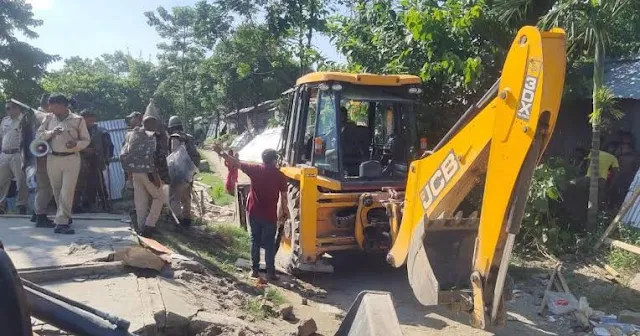By A Representative
Raising serious objection to the manner in which people belonging to the minority community were evicted in Dholpur village of Darrang district, a high-level delegation has told Assam chief minister Hemanta Biswa Sarma that as many as 900 families living along the river have been evicted. These families were doing "organized farming project on 25,000 acres of land", Sarma was told.
Raising serious objection to the manner in which people belonging to the minority community were evicted in Dholpur village of Darrang district, a high-level delegation has told Assam chief minister Hemanta Biswa Sarma that as many as 900 families living along the river have been evicted. These families were doing "organized farming project on 25,000 acres of land", Sarma was told.
The delegation, consisting of the Jamaat-e-Islami Hind (JIH), Jamiat Ulema-e-Hind (JUH) and the Students Islamic Organization (SIO) met the Assam chief minister in order to ensure "strict action" against culprits for brutality during the Dholpur eviction drive, insisting, all those who have been displaced should be rehabilitated forthwith.
Speaking to media, JIH president Syed Sadatullah Husaini said, "Before carrying out evictions on any land or area, a complete legal procedure has to be followed and alternative accommodation has to be arranged for the people who are being displaced, as per the interpretations of the law."
"But this has not been done in Dholpur village of Darrang district, even where the inhumane treatment has been meted out to the villagers, giving communal colour to the eviction drive,” he added.
The joint delegation included JIH vice-president S Ameenul Hassan and JUH general secretary Maulana Hakimuddin Qasmi, JIH secretary Shafi Madani, SIO president Salman Ahmed, among others.
A report presented by the joint delegation after visiting the affected area to the chief minister said, the administration did not follow due eviction procedures, including alternative arrangements for accommodation, livelihood, education and health of long-term residents before they are evicted. The manner in which a particular community has been targeted by giving a communal colour.
Raising concern over the death of two "unnamed civilians", the delegation demanded the whole incident be investigated impartially and transparently, taking action against the culprits. "As promised, one acre of land for farming and one acre of land for housing as well as basic education and health facilities should be provided to the affected families immediately. The delegation also demanded that the families who have been evicted and those who have died be given adequate compensation",, Ameenul Hassan said
"But this has not been done in Dholpur village of Darrang district, even where the inhumane treatment has been meted out to the villagers, giving communal colour to the eviction drive,” he added.
The joint delegation included JIH vice-president S Ameenul Hassan and JUH general secretary Maulana Hakimuddin Qasmi, JIH secretary Shafi Madani, SIO president Salman Ahmed, among others.
A report presented by the joint delegation after visiting the affected area to the chief minister said, the administration did not follow due eviction procedures, including alternative arrangements for accommodation, livelihood, education and health of long-term residents before they are evicted. The manner in which a particular community has been targeted by giving a communal colour.
Raising concern over the death of two "unnamed civilians", the delegation demanded the whole incident be investigated impartially and transparently, taking action against the culprits. "As promised, one acre of land for farming and one acre of land for housing as well as basic education and health facilities should be provided to the affected families immediately. The delegation also demanded that the families who have been evicted and those who have died be given adequate compensation",, Ameenul Hassan said
The chief minister assured the delegation that all citizens of the state will be treated equally and nobody would be treated unfairly, Hassan informed media, adding, the delegation also met the Deputy Commissioner and the Superintendent of Police, Darrang, to raise the issue. They assured to deliver justice to the victims impartially.


Comments